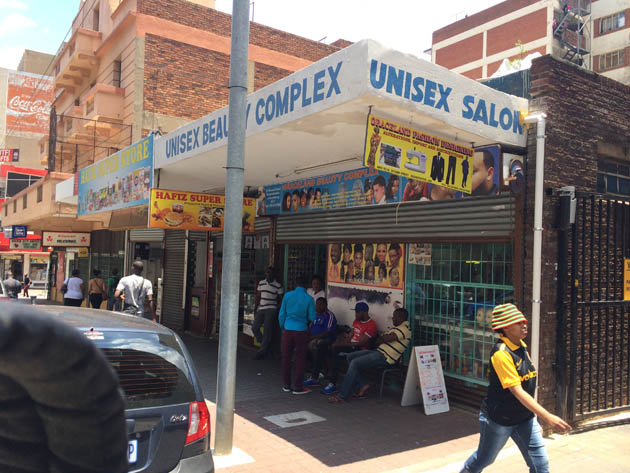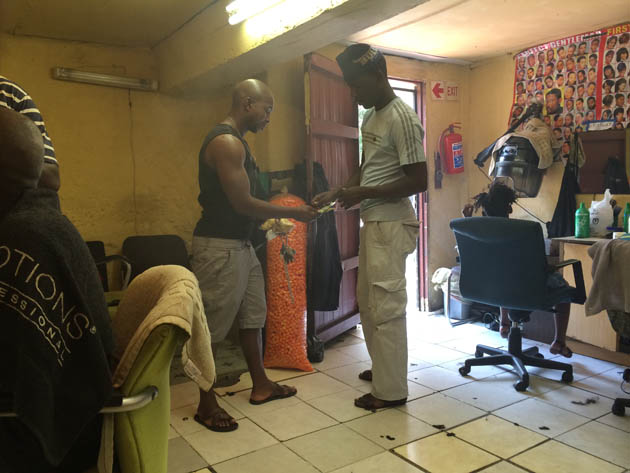On the 7th of December, I left London to travel through SubSaharan Africa for six week researching a play about barber shops. The project is supported by The Binks Trust, The British Council and Fuel Theatre Limited. This is the second of six journey-logs.
Barber Shop Chronicles / 15 December / Zimbabwe*
I wasn't granted a Zimbabwean visa before I left London. The plan was to visit the consulate in JoBurg, first thing on Monday, 9th of Dec and apply for a visa. The plan failed. The backup plan was to visit on Tuesday, but all of Joburg is shut for Nelson Mandela's funeral ceremony. That plan failed too. The consulate do not open on Wednesdays, so on Thursday, I finally make it and the queue is long, boisterous and baking in the heat. When it is my turn, the attendant asks that I have the hotel booked in Zimbabwe reprint my reservation on a letter headed paper and I should return with it later today. I ask, assuming that were possible, how long it would take to process the application. He replies 'ten working days'. I will not get the visa in time. The new plan is to exclusively to find Zimbabweans in JoBurg, to speak with them in barber shops they frequent.
It is Monday 16th of December. Christmas is nine days away and many Zimbabweans have gone home. Those left are running around buying gifts for relatives and preparing to leave. I am sat outside the hotel in Braamfontain weighing my decreasing options against the indifferent and beautiful skies, when my friend Milisuthando points to a waiter running by saying “His name is Jackson, he served my friend well at a bar, he is incredibly knowledgeable and politically astute about Zim.” I give chase, catch him in a tiny corner shop and ask if he'd mind speaking with me, if I can have his number. He agrees and we plan to meet later in the week.
Shoni mentions his brother-in-law is from Zimbabwe but is running around, moving house, gathering for the migration home for Christmas, but he will try to set something up. The conversations I have heard about the Zimbabwean presence in Johannesburg have been overwhelmingly positive, to the point of being negative. 'They are hard working' becomes 'They work too hard working' becomes 'They are taking our jobs' becomes 'They work twice as hard for half the money'. During the Windrush period of British history, such sentiments were levelled at Caribbean and West Indian immigrants, then at Black Africans, and now such is levelled at Eastern Europeans in the UK. A dark part of me takes pride at having found final, first-hand proof that black Africans are at least partially as prejudiced to one another as some Europeans are to themselves, proof that "we are not all the same". Instantly, a lump of shame rises in my throat at the realisation that I still on some level, judge Africans by European characteristics and standards, negative or positive. Exactly how deep does the colonial rabbit hole run through me? If an African is an island, is he still a man? What is a man? I choke on the shard of self-hatred and carry on.
Tuesday, I meet Dwain, a slim-built, dreadlocked Zimbabwean musician living in JoBurg, who regularly visits Harare. He confirms what I imagined, that I was not granted a visa because I applied as a writer from the UK, Zimbabwe is not kind to such folk. I ask why and he says it is because of what the west say about Mugabe, how he is spoken of. Dwain adds that because I have a Nigerian passport though, I should have just boarded a flight to Harare, that despite the restrictions detailed on the consulate's website, I'd have been able to purchase an entry visa at Harare's airport. He adds that many guys have dreadlocks in Zim, it's in fashion now, so at the moment barber shops are not frequented that much. I ask why this is the case and he replies Bob Marley played at their celebration of independence in 1980 when, after bitter, bloody battles, they finally won the struggle against Imperialism and British rule - Rastafarianism is big in Zim. I tell Dwain about the Ghanaian barber in London who loves Mugabe, claims he is what a leader should be: one who fights for his people come what may. I ask what Mugabe did exactly, why he is so hated and Dwain says simply 'he took back our land'. It's that simple. No theory, no fancy political rhetoric, he took back what was ours, force was used where necessary. I ask if this is why sanctions were placed on the country and he confirmed it so; the Zimbabwean dollar plummeted, because of this and the battles, Zimbabweans left the country, but things are brightening up, people are coming back, banks are reopening, cash machines are working, he makes more money playing in Zim than he does in South Africa, when he returns, he plays Chimurenga music (Chimurenga means 'struggle' in Shona, a Zimbabwean language) in an attempt to counter reggae and Marley's overwhelming influence. He says I would have loved Harare, a city that never sleeps - is what its name means - and I promise to visit in future.
It is Wednesday the 18th. Evening. Jackson is dodging my phone calls. Shoni's in-law is too busy. I have three days before I leave South Africa and there isn't a Zimbabwean in sight. Hours before, I'd journeyed to Pretoria, a town close to JoBurg, following a lead to a Zimbabwean barber. When I arrive, he tells me he only does dreadlocks confirming what Dwain said, but he has no more clients for the day. Before this however, he grills me on the project. 1)Why barbers shops? 2)Why Zimbabweans? 3)What kind of conversations? 4)Will I pay the barbers and clients? I reply: 1)Because men talk freely there: 2)Because Zimbabwe is English-speaking and I can understand such conversations and there are Zimbabweans in the UK - I am travelling to countries that have a significant presence in there: 3)Any kind of conversation will do, the play is an anthology of subjects, not a single theme or narrative. 4)No I cannot pay the barbers or clients, I cannot afford to pay people to talk to me about anything and everything; it isn't financially sound. He nods, satisfied at my answers having grasped the scope of the project, maintains he cannot help, but wishes me good luck, shaking my hand warmly.
Thursday and I am even more desperate, I begin asking anyone and everyone. Titus a taxi driver promises to link me with a place he used to frequent, calls a couple hours later with a number and an address. The following day Titus drops me at the spot, a tiny shack of a barber shop in Hillbrow. The language spoken is a mixture of Zulu/Shona and I do not understand a word of what is said. Titus had already explained the project to the owner, who welcomes me warmly, gestures to a place prepared for me to sit and watch how this, his tiny, hot, bustling world works.
The walls are the dirty side of off white. When the clients arrive, the barbers speak over the deep South African house music blasting from the speakers, just loud enough to whisper jokes, set them at ease, then send their shoulders shaking in ripe, plump laughter. One barber sips a bottle of Heineken as he works. The clients are mostly women - for the barber shop is unisex - and they all seem to want the same thing. The barbers comb thick white relaxer into their hair, starting from the back, the neck, combing upwards to the crown and finally the front. They let the relaxer cook the hair, thinning the strands for a few minutes before the wash. The barbers guide them gently by the elbows to the even tinier back-room, where they wash throughly and deeply, massaging the scalp, sweeping and rubbing with their thumbs. When they return, the barbers comb and blowdry in long strokes, blasting clouds of water and chemicals from the hair, combing till it is tamed, till it flops down heavy, deflated as defeated tribes. Sunday morning, I am to leave South Africa, and hunched at my desk, I make a list of things I have learnt this week:
1) Pres. Mugabe has at least eight degrees in various fields. 2) Pres. Mugabe has been awarded a dozen or more honorary degrees. 3) Pres. Mugabe is probably the most educated politician on the planet. 4) Ndebele tribesmen are in Zimbabwe and South Africa. 5) The South African king Shakka was by all accounts, a badass mother. 6) Hell hath not fury like a Zulu scorned. #Shakka 7) We are all racists. 8) Harare means 'City that never sleeps.' 9) Harare North is what Zimbabweans call London. 10) I deeply miss Harare North.
Next stop, Kenya, Nairobi.




